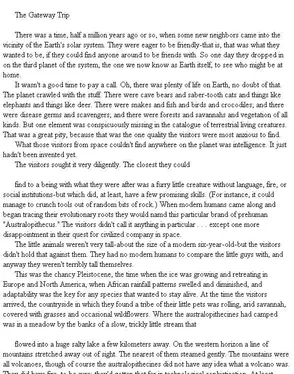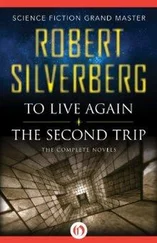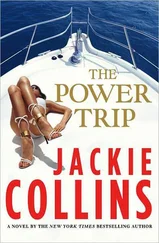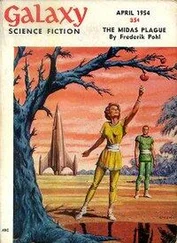Pohl, Frederik - The Gateway Trip
Здесь есть возможность читать онлайн «Pohl, Frederik - The Gateway Trip» весь текст электронной книги совершенно бесплатно (целиком полную версию без сокращений). В некоторых случаях можно слушать аудио, скачать через торрент в формате fb2 и присутствует краткое содержание. Жанр: Старинная литература, на английском языке. Описание произведения, (предисловие) а так же отзывы посетителей доступны на портале библиотеки ЛибКат.
- Название:The Gateway Trip
- Автор:
- Жанр:
- Год:неизвестен
- ISBN:нет данных
- Рейтинг книги:4 / 5. Голосов: 1
-
Избранное:Добавить в избранное
- Отзывы:
-
Ваша оценка:
- 80
- 1
- 2
- 3
- 4
- 5
The Gateway Trip: краткое содержание, описание и аннотация
Предлагаем к чтению аннотацию, описание, краткое содержание или предисловие (зависит от того, что написал сам автор книги «The Gateway Trip»). Если вы не нашли необходимую информацию о книге — напишите в комментариях, мы постараемся отыскать её.
The Gateway Trip — читать онлайн бесплатно полную книгу (весь текст) целиком
Ниже представлен текст книги, разбитый по страницам. Система сохранения места последней прочитанной страницы, позволяет с удобством читать онлайн бесплатно книгу «The Gateway Trip», без необходимости каждый раз заново искать на чём Вы остановились. Поставьте закладку, и сможете в любой момент перейти на страницу, на которой закончили чтение.
Интервал:
Закладка:
Well, then, how about drilling without an igloo?
Possible, I judged. Pointless, though. Suppose we did hit lucky and hole in? Without a sealed igloo to lock out those ninety thousand millibars of hot, destructive air, we'd destroy anything fragile inside before we got a look at it.
I felt a nudge on my shoulder and discovered that Dorrie was sitting next to me. She didn't ask any questions, didn't try to say anything at all. I guess it was all clear enough without talking about
it.
By my suit chronometer thirteen hours were gone. That left
thirty-some before Cochenour would come back to get us. I didn't
see any point in spending it all sitting there.
But, on the other hand, I didn't see any point in doing anything
else.
Of course, I thought, I could always go to sleep for a while
and then I woke up, and realized that that was what I had been doing.
Dorrie was curled up beside me, also asleep.
You may wonder how a person can sleep in the teeth of a south polar thermal gale. It isn't all that hard. All it takes is that you be wholly worn out, and wholly despairing. Sleeping isn't just to knit that old raveled sleave, it is a good way to shut the world off when the world is too lousy to face. As ours was.
But Venus may be the last refuge of the Puritan ethic. On Venus you work. The ones who don't feel that way get selected out early, because they don't survive.
It was crazy, of course. In any logical estimate I knew I was as good as dead, but I felt I had to be doing something. I eased away from Dorrie, making sure her suit was belted to the hold-tight ring at the base of the igloo, and stood up.
It took a great deal of concentration for me to be able to star~d up. That was all right. It was almost as good as sleeping at keeping thoughts of the world out.
It occurred to me-I admit that even then it seemed like no more than an outside possibility-that something good had happened while Dorrie and I were asleep. Something like-oh, let's say
oh, maybe that there still might be eight or ten live Heechee in the tunnel ... and maybe they'd heard us knocking and opened up the bottom of the shaft for us. So I crawled into the igloo to see if they had.
Nope. They hadn't. I peered down the shaft to make sure, but it was still just a blind hole that disappeared into dirty dark at the end of the light from my head lamp. I swore at the inhospitable Heechee-for being nonexistent, I guess-and kicked some tailings down the hole onto their absent heads.
The Puritan ethic was itching at me somewhere. I wondered
what I ought to be doing. I couldn't think of too many choices. Die? Well, sure, but I was well on my way to doing that as fast as I could. Wasn't there something constructive?
The Puritan ethic reminded me that you always ought to leave a place the way you found it, so I hauled the drills up on the eight-to-one winch and left them hanging neatly while I kicked some more tailings down the useless hole. When I had made enough space for a place to sit, I sat down and thought things over.
I mused about what we had done wrong-not with a view toward doing it right, you see, but more like an old chess puzzle. How had we missed finding a tunnel?
After some time of cloudy cogitation, I thought I knew the answer to that.
It had to do with what an autosonic trace was like. People like Dorrie and Cochenour have the idea that a seismic trace is like one of those underground maps of downtown Dallas that shows all the sewers and utility conduits and water pipes and subways, marked so if you need to get into one of them you can just dig down where it says and you'll find what you want right there.
It isn't exactly like that. The trace is more probabilistic. It comes out as a sort of hazy approximation. It is built up, minute by minute, by the echoes from the pinger. It looks like a band of spiderweb shadows, much wider than any actual tunnel would be and very fuzzy at the edges. When you look at the trace, you know that the best it's telling you is that there's something that makes the shadows. Maybe it's a rock interface or a pocket of gravel. Hopefully it's a Heechee dig. Whatever it is, it's there somewhere, but you don't know just where, exactly. If a tunnel is ten meters wide, which is fair average for a Heechee connecting link, the shadow trace is sure to look like fifty, and may appear to be a hundred.
So where do you dig?
That's where the art of prospecting comes in. You have to make an informed guess.
Maybe you dig in the exact geometrical center-as it is given
you to see where the center is. That's the easiest way. Or maybe you dig where the shadows are densest, which is the way the most experienced prospectors do. That works as well as anything else.
But that's not good enough for smart, skilled old Audee Walthers. I do it my own way. What I do, I try to think like a Heechee. I look at the trace as a whole and try to see what points the Heechee might have been trying to connect. Then I plot an imaginary course between them, where I would have put the tunnel if I'd been the Heechee engineer in charge, and I dig where I would have planted the thing in the first place.
That's what I had done. Evidently I had done it wrong.
Of course, there was one good way I could have gone wrong:
the trace could have been a pocket of gravel.
That was a really good possible explanation, but not a useful one. If there had never been a tunnel there in the first place we were just all out of luck. What I wanted was a more hopeful answer, and in a fuzzy-brained sort of way, I began to think I saw one.
I visualized the way the trace had looked on the scope. I had set the airbody down as close to that as I could manage.
Then, of course, I couldn't dig right there, because the airbody was on top of it. So I'd set the igloo up a few meters upslope.
I began to believe that those few meters were what made us miss.
That fuzzy conjecture pleased my fuzzy brain. It explained everything. It was admirable of me, I told myself, to figure it all out in my present state. Of course, I couldn't see that it made any practical difference. If I'd had another igloo I would have been glad to move back to where the airbody had been and try again, assuming I could live long enough to get all that done.
But that didn't mean much, because I didn't have another igloo.
So I sat on the edge of the dark shaft, nodding approvingly to myself over the intelligent way I had thought the problem through, dangling my legs, and now and then sweeping some tailings back in. I think all that was part of some kind of death wish, because I know that I thought, every once in a while, that the nicest thing for me to do just then would be to jump in and pull the tailings down over me.
But the Puritan ethic didn't want me to do that.
Anyway, I would have only solved my own personal problem that way. It wouldn't have done a thing for young Dorotha Keefer, snoring away outside in the thermal gale. I worried about Dorotha Keefer. I wanted something better for her than a life of chancy, sordid scrounging in the Spindle. She was too sweet and kind and-It struck me as a revelation that one of the reasons for my
hostility to Boyce Cochenour had been that he had Dorrie Keefer and I didn't.
That was kind of interesting to think about, too. Suppose, I thought, tasting the bad flavors inside my mouth and feeling my head begin to pound-suppose Cochenour's suit had ruptured when the drill fell on him and he had died right there. Suppose (going a little farther) we'd then found the tunnel, and it was all we wanted from it, and we went back to the Spindle and got rich, and Dorrie and I had-
I spent a lot of time thinking about what Dorrie and I might have done if things had gone just a little different way and all that had happened to be true.
Читать дальшеИнтервал:
Закладка:
Похожие книги на «The Gateway Trip»
Представляем Вашему вниманию похожие книги на «The Gateway Trip» списком для выбора. Мы отобрали схожую по названию и смыслу литературу в надежде предоставить читателям больше вариантов отыскать новые, интересные, ещё непрочитанные произведения.
Обсуждение, отзывы о книге «The Gateway Trip» и просто собственные мнения читателей. Оставьте ваши комментарии, напишите, что Вы думаете о произведении, его смысле или главных героях. Укажите что конкретно понравилось, а что нет, и почему Вы так считаете.












